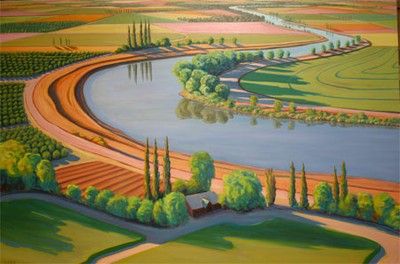Jan 18th, 2013

Portuguese Bend, Sacramento River, oil painting by Phil Gross, 2006http://www.philgross.net copyright © 2013 Phil Gross
***Video of seminar*** http://webcast.ucdavis.edu/llnd/8202cf3
The Delta Science Program and the UC Davis Center for Aquatic Biology & Aquaculture (CABA) are pleased to announce a seminar and workshop:
Keynote Speaker
Professor Geoffrey Petts
Vice-Chancellor of the University of Westminster, London, U.K
Convened by Peter Goodwin and Chris Enright of the Delta Science Program
ABSTRACT
This seminar will explore how the hydrologic regime of Delta inflows are impacted by land-use changes, diversions and climate change. These concepts are important since successful restoration relies on restoring the physical processes within the landscape that will sustain chemical and biotic processes that support native biological community resilience. However, in a highly modified landscape many of these changes are irreversible and the hydrologic response of the watershed is different from historic conditions. These differences are further compounded by the effects of climate change which affects total runoff, alters the inter-annual variability and increases the frequency of extreme events.
The extent to which physical process and ecosystem functions can be recovered is an important question and is heavily influenced by the flow regime. But this poses the question of what is natural or even functional flow if the very landforms that historically shaped the hydrograph are now modified? Given these systemic changes, what do we mean by a natural hydrograph or unimpaired flows? The seminar explores the experiences of establishing flow regimes in regulated river systems from California, elsewhere in the US and from around the world. Presentations and panel discussions will focus on how the modified hydrology and landscape morphology of the Bay-Delta watershed can be reconciled to produce sustainable ecosystem functions and services.
Seminar Format
The day-long meeting will comprise seven lectures on aspects of functional flow regimes with the opportunity for participant questions after each lecture. The seminar will conclude with a facilitated panel discussion.
Please bring your smart phone or tablet if available. The opinions of participants will be solicited during the panel discussion through online polling.
The Delta Science Program (DSP), with assistance from the seminar speakers, is preparing a synthesis of literature related to functional flow regimes in regulated rivers. We encourage participants to submit key references or comments to the DSP during the seminar or before January 31, 2013. Please submit to cenright@deltacouncil.ca.gov.
S C H E D U L E
MORNING:
8:30 a.m. Welcome and Seminar Objectives.
Peter Goodwin, Convener and Lead Scientist, Delta Science Program
8:40 a.m. Plenary Lecture: In-stream Flow Science for Sustainable River Management.
Geoffrey Petts, Vice-Chancellor, University of Westminster, London, UK
Landscape Drivers and their Significance for Altered Hydrographs
9:30 a.m. What Do We Mean by “Natural Functional Delta Inflow” in a Regulated and Modified System?
Chris Enright and Peter Goodwin, Delta Science Program
10:00 a.m. Delta Inflows of the Past: Lessons for Connecting Landscape Elements – Hydrograph Variability and Functions from the Historical Landscape.
Robin Grossinger and Alison Whipple, San Francisco Estuary Institute
10:30 a.m. Break
Current Delta Flow Regimes and Adaptive Potential
10:45 a.m. Delta Inflows: Hydrographs and Ecological Functions in the Present-day Landscape – Contrasting the Sacramento and San Joaquin River Systems.
Bruce Herbold, U.S. EPA
11:15 a.m. Ecological Response to the Unregulated Spring Flow Regime in California's Sierra Nevada.
Sarah Yarnell, UC Davis
11:45 a.m. No Host Lunch
AFTERNOON
Alternative Futures
1:00 p.m. Examples of Managed Flow Regimes – Possible Models for the Delta.
Cliff Dahm, University of New Mexico
1:30 p.m. Use of Unimpaired Flow Requirements to Protect San Joaquin River Fish and Wildlife.
Les Grober and Rich Satkowski, CA State Water Resources Control Board
2:00 p.m. General Q&A on Presentations
2:30 p.m. Break
Facilitated Panel Discussion
2:45 p.m. Presenters Panel - Facilitators: Geoff Petts and Chris Enright
4:15 p.m. Wrap-Up - What Have We Learned? And Next Steps. Facilitator: Peter Goodwin
4:30 p.m. Adjourn